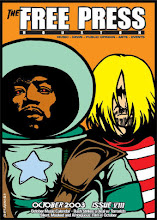Tony Manero
The Chilean film Tony Manero flows in many directions. As a character study the lead actor (Alfredo Castro as Raúl) plays as unlikeable a guy as an impotent dancer and sometimes spontaneous killer can be. As political allegory setting the story in the late-70s in Pinochet ruled Chile makes sense and the various predicaments the characters find themselves in are fueled by living under such a dictatorship. As a bizarre comedy Tony Manero rates high because so much of the time we want to laugh only the strange proceedings are too tragic to warrant anything but stunned silence.
Tony Manero is the John Travolta character from Saturday Night Fever and Raúl spends most of his time as the only one at the movies watching Travolta's moves. Raúl heads a theatrical troupe who perform the SNF dance onstage only his sullen mood keeps the other performers on edge. Glimpses of television depict a Chile obsessed with celebrity impersonators whether it's Travolta or Chuck Norris or Julio Iglesias. Raúl himself crashes such a show dressed as Tony Manero.
Most of the film is seen though Raúl's eyes and at times the filmmaking seems fragmented. Sex scenes and violence often explode and are just as suddenly over. But when you put all the pieces of Tony Manero together at the end you find a method to the madness.













